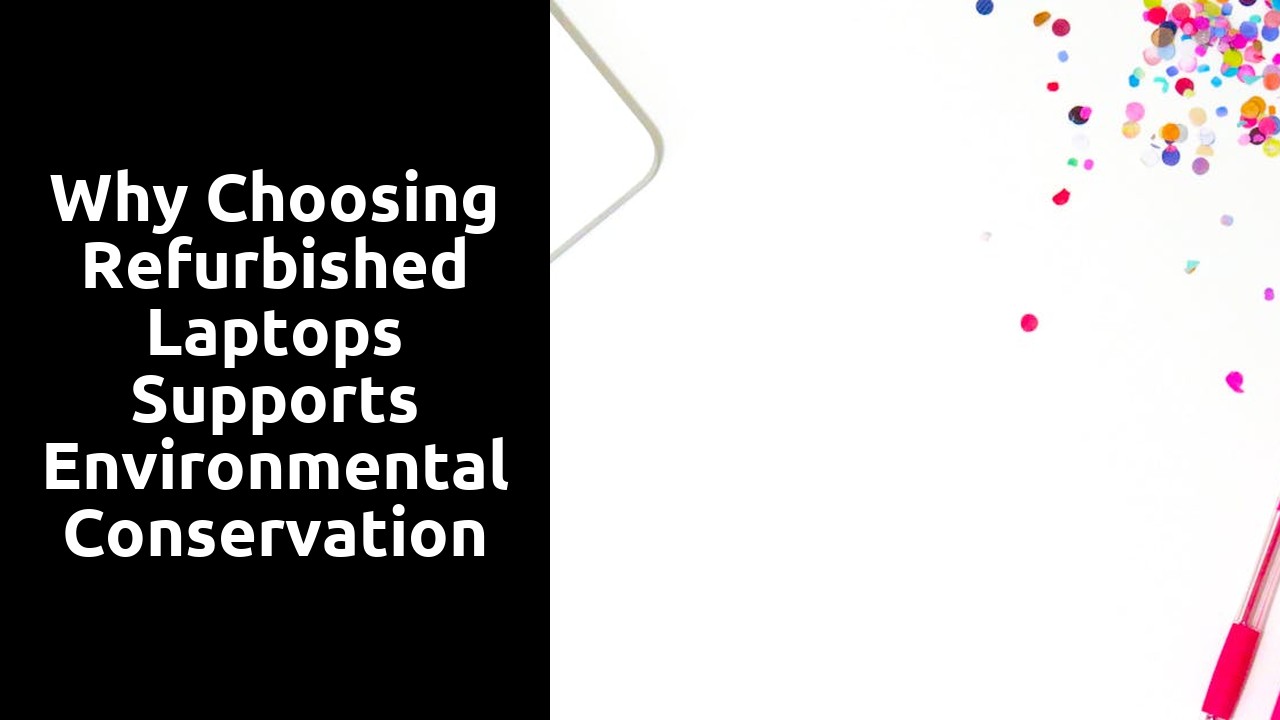
Why Choosing Refurbished Laptops Supports Environmental Conservation
EWaste Recycling Process
The e-waste recycling process is essential in mitigating the environmental impact of electronic devices reaching the end of their life cycle. When electronic devices such as laptops are disposed of improperly, they contribute significantly to the growing issue of electronic waste. Recycling these devices ensures that valuable materials like metals and plastics are extracted and reused, reducing the need for virgin resources in manufacturing new electronics. Through responsible recycling practices, the environmental strain caused by the disposal of electronic waste can be significantly lessened.
By recycling e-waste, we not only prevent harmful substances from leaching into the environment but also reduce the energy consumption and greenhouse gas emissions associated with mining and manufacturing new materials. The recycling process involves sorting, dismantling, and extracting valuable components from electronic devices to be used in the production of refurbished products. This approach not only conserves resources but also minimises the carbon footprint of electronic devices. Through proper e-waste recycling practices, we can work towards a more sustainable future for our planet.
How Refurbished Laptops Support Sustainable Recycling Practices
Refurbished laptops play a crucial role in supporting sustainable recycling practices. By choosing a refurbished laptop over a brand-new one, you are essentially extending the lifespan of a perfectly functional electronic device. This decision directly contributes to reducing electronic waste and lessening the environmental impact associated with manufacturing new laptops. In this way, purchasing refurbished laptops supports the concept of a circular economy where resources are used more efficiently and waste production is minimised.
Moreover, opting for refurbished laptops helps prevent the disposal of electronic devices into landfills, where they can release harmful chemicals and contribute to soil and water contamination. Through refurbishment, laptops are given a new lease on life, diverting them from the waste stream and ensuring that their components are reused or recycled responsibly. This process not only conserves valuable resources such as metals, plastics, and rare earth elements but also reduces the energy consumption and greenhouse gas emissions associated with manufacturing new laptops. Ultimately, choosing refurbished laptops is a sustainable choice that aligns with the principles of environmental conservation and resource efficiency.
Sustainable Manufacturing Practices
Refurbished laptops play a pivotal role in supporting sustainable manufacturing practices. By opting for refurbished electronics, consumers contribute to reducing the demand for new laptops, thus lessening the need for the extraction of raw materials and the energy-intensive manufacturing process. This results in significant reductions in carbon emissions and environmental impact associated with the production of new laptops.
Furthermore, the refurbishing of laptops involves refurbishers repairing and restoring used devices to nearly-new condition, extending their lifespan and diverting them from ending up in landfills. This process not only minimises electronic waste but also promotes a circular economy by reusing valuable resources. Sustainable manufacturing practices, such as refurbishing laptops, are essential in mitigating the environmental footprint of the electronics industry and moving towards a more environmentally conscious consumption model.
The Environmental Benefits of Refurbishing Electronics
Refurbishing electronics, such as laptops, offers a myriad of environmental benefits that should not be overlooked. By choosing refurbished laptops, consumers actively participate in reducing electronic waste and its harmful impact on the environment. The refurbishing process helps to extend the lifespan of electronic devices, ultimately decreasing the amount of e-waste that ends up in landfills or incinerators.
Moreover, refurbishing electronics contributes to a decrease in the demand for new electronic devices, which in turn reduces the need for raw materials and energy-intensive manufacturing processes. This shift towards reusing and repurposing existing electronics helps to conserve valuable resources and minimises the environmental footprint associated with the production of new devices. Ultimately, the environmental benefits of refurbishing electronics align with sustainable practices and support the ongoing effort to reduce the environmental impact of electronic consumption.
Energy Efficiency
Energy efficiency is a crucial aspect when considering the environmental impact of electronic devices. Refurbished laptops play a significant role in conserving energy resources due to their improved energy efficiency compared to older models. These laptops are often equipped with modern components that are designed to consume less power, helping to reduce energy consumption and lessen the overall carbon footprint.
By opting for refurbished laptops, individuals and businesses can contribute to the conservation of energy resources. Energy-efficient laptops not only benefit the environment but also lead to cost savings for users through reduced electricity bills. The shift towards energy-efficient electronics, such as refurbished laptops, represents a step towards a more sustainable future where technology and environmental conservation go hand in hand.
How Refurbished Laptops Help in Conserving Energy Resources
Refurbished laptops play a crucial role in energy conservation due to their more efficient performance compared to older models. By using refurbished laptops, individuals and businesses can significantly reduce their energy consumption, leading to a positive impact on the environment. These laptops are often equipped with modern, energy-efficient components that require less power to operate, resulting in lower electricity usage and decreased greenhouse gas emissions.
In addition to the direct energy savings during operation, the refurbishing process itself contributes to energy conservation. Rather than producing entirely new laptops, refurbishment involves repairing and upgrading existing devices, which requires less energy than manufacturing a brand-new product. This means that by choosing refurbished laptops, consumers are not only reducing energy consumption during use but also helping to lessen the overall energy demand associated with the production of electronics.
Related Links
A Historical Perspective on the Environmental Impact of Refurbished LaptopsWhy Refurbished Laptops are Environmentally Friendly
5 Environmentally Friendly Refurbished Laptops You Should Consider
Review: Environmentally Friendly Refurbished Laptops A Sustainable Choice